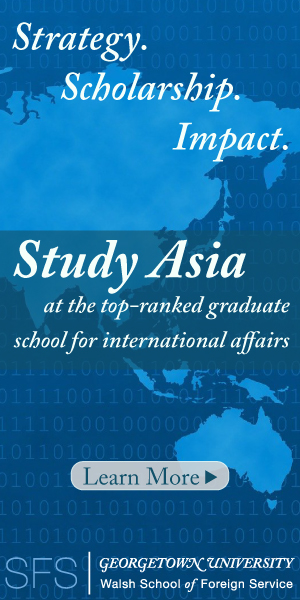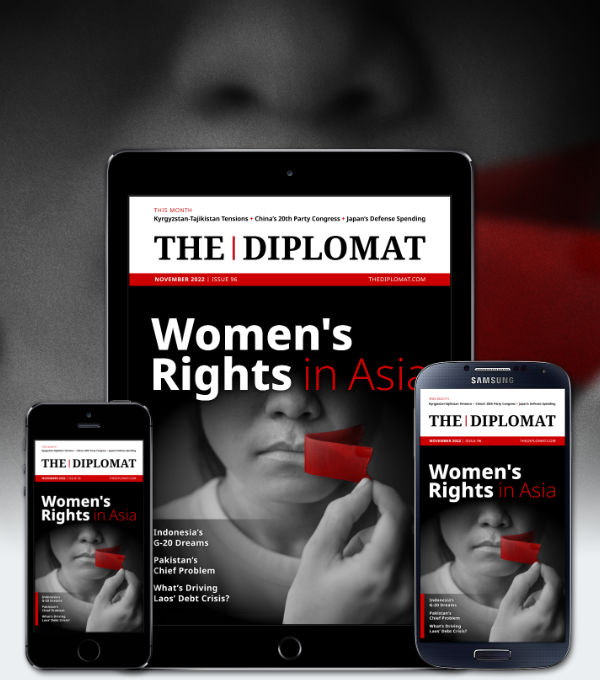| Welcome to the latest issue of Diplomat Brief. This week our top story highlights the limits on China-U.S. climate cooperation following COP27. We also have an interview with Andrew Small, a senior transatlantic fellow with the Asia program at the German Marshall Fund of the United States, on the rupture between China and the West. |
| Story of the week |  | Environment Can China and the US Cooperate on Climate Change?What Happened: On the back of the Biden-Xi presidential meeting in Bali, China’s climate envoy, Xie Zhenhua, made an unannounced appearance alongside his U.S. counterpart, John Kerry, at an event dedicated to reducing methane emissions at COP27. It was a clear-cut affirmation that official engagements between China and the United States on all things climate were back – that cooperation had come to an abrupt end in the aftermath of U.S. House Speaker Nancy Pelosi’s visit to Taiwan. But given the state of tensions at play in the broader relationship, there are hard limits to how far China and the U.S. can take their cooperation on climate issues. Our Focus: At heart, many of the issues tied up with climate change prevention and mitigation come down to technology. Beijing and Washington know this as well as anyone. “Both countries have assigned strategic importance to technological innovation and up-skilling of their labor markets in their battle against the looming climate crisis and their push toward the creation of green economies,” Nima Khorrami, a research associate at the Arctic Institute in Washington, D.C., writes for The Diplomat. But both governments see tech development – including progress on crucial clean energy technology – as a zero-sum game, where one side’s gains are the other’s losses. Making matters worse, “China-U.S. technological competition is not confined to the innovation race alone,” Khorrami notes. “Rather, it includes a fierce, and fast-intensifying, rivalry over the establishment of regulatory frameworks for the development and governance of new technologies.” What Comes Next: As China and the U.S. compete to dominate the technologies of the future – which happen to be crucial tools in the global fight against climate change – their willingness to work together is sharply curtailed. In the current context, “Technological knowhow and technology transfers are viewed as instruments of leverage and influence, which China and the United States could utilize to tilt other states into their own spheres of influence,” Khorrami explains. In the end, cooperation to tackle climate change will only be possible if Beijing and Washington manage to control their technological rivalry – a prospect that looks distant at best. Read this story |
| Behind the News | INTERVIEW Andrew SmallAndrew Small, a senior transatlantic fellow with the Asia program at GMFUS and the author of “No Limits: The Inside Story of China's War with the West,” on whether the current tensions between China and the West were inevitable: “It seems entirely plausible to me that the debate in the Chinese system, characterized in the book as ‘assertive now or assertive later,’ could have broken in the latter direction. Another leader could have made the assessment that there was still a period in which relations with the United States and Europe needed exceptionally careful management.” Read the interview |
| This Week in Asia | Northeast Asia Taiwan's Midterm ElectionsOn November 26, Taiwan’s voters will cast ballots in three separate elections: for mayor/county magistrate, city council members, and finally a referendum on whether or not to change the legal voting age to 18. Notably, while national elections in Taiwan are heavily impacted by cross-strait relations, these local races are less impacted by the China factor. But the polls will still be closely watched for the potential of a KMT comeback. Find out more | South Asia Pakistan's Next Chief of Army StaffPakistan’s Chief of Army Staff (COAS) General Qamar Javed Bajwa will be retiring by the end of November, and his successor is a critical point of political contention in the country. Bajwa has lately tried to keep Pakistan’s powerful military out of civilian politics, but both former Prime Minister Imran Khan and the current PML-N government want a new COAS that will be on their side. Find out more | Southeast Asia Political Uncertainty in MalaysiaMalaysia remains in political limbo after the November 19 general election delivered a hung parliament. With none of the major parties able to form a government on their own, the country awaits the intervention of the country’s king to decide whether the next government will be headed by the multiethnic Pakatan Harapan coalition, led by veteran opposition leader Anwar Ibrahim, or the conservative Perikatan Nasional coalition headed by former prime minister Muhyiddin Yassin. Find out more | Central Asia Europe’s Growing Engagement with Central AsiaAs the world's largest economies gathered for the G-20 in Indonesia last week, the EU’s foreign policy head, Josep Borrell, followed in the footsteps of other top European leaders this year and made the trek to Central Asia. The region, once viewed as “neighbors of its neighbors,” has seen renewed attention from Europe. Find out more |
| Visualizing APAC |  | North Korea successfully launched its Hwasong-17 ICBM on Friday, on what is believed to be its third attempt. To celebrate, KCNA released a batch of photos of the missile and Kim Jong Un at its latest launch. See the full picture |
| Word of the Week | Politics No, Not AgainA slogan (in English) used in Nepal to decry the perennial reappearance of the same older politicians in the top governing positions. Find out more |
| Webinar Alert | The Diplomat Asks The China-US Tech War: What's Next?In October, the U.S. government released a major set of new regulations restricting China's access to advanced technologies. A few weeks later, China’s rulers doubled down on their determination to become a leading technological power at the 20th Party Congress and in a subsequent white paper. What comes next in the China-U.S. competition for tech dominance? And how will their “tech war” impact third countries – and the global technology sector? Join us on November 29 at 1 p.m. U.S. Eastern time for a discussion about the future of the China-U.S. tech competition. Featuring: Johanna M. Costigan, a Junior Fellow at the Asia Society Policy Institute's Center for China Analysis. Shihoko Goto, the Director for Geoeconomics and Indo-Pacific Enterprise and Deputy Director for the Asia Program at the Wilson Center. Top of Form Alexandra Seymour, an Associate Fellow for the Technology and National Security Program at the Center for a New American Security. Sign up for the webinar |
|  |




